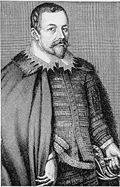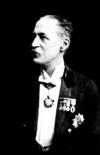Portal:University of Oxford
| Main page | Indices | Projects |
The University of Oxford portal
The University of Oxford is a collegiate research university in Oxford, England. There is evidence of teaching as early as 1096, making it the oldest university in the English-speaking world and the world's second-oldest university in continuous operation. It grew rapidly from 1167, when Henry II banned English students from attending the University of Paris. After disputes between students and Oxford townsfolk, some Oxford academics fled northeast to Cambridge, where they established the University of Cambridge in 1209. The two English ancient universities share many common features and are jointly referred to as Oxbridge.
The University of Oxford is made up of 43 constituent colleges, consisting of 36 semi-autonomous colleges, four permanent private halls and three societies (colleges that are departments of the university, without their own royal charter), and a range of academic departments which are organised into four divisions. Each college is a self-governing institution within the university, controlling its own membership and having its own internal structure and activities. All students are members of a college. The university does not have a main campus, but its buildings and facilities are scattered throughout the city centre. Undergraduate teaching at Oxford consists of lectures, small-group tutorials at the colleges and halls, seminars, laboratory work and occasionally further tutorials provided by the central university faculties and departments. Postgraduate teaching is provided in a predominantly centralised fashion.
Oxford operates the Ashmolean Museum, the world's oldest university museum; Oxford University Press, the largest university press in the world; and the largest academic library system nationwide. In the fiscal year ending 31 July 2023, the university had a total consolidated income of £2.92 billion, of which £789 million was from research grants and contracts.
Oxford has educated a wide range of notable alumni, including 31 prime ministers of the United Kingdom and many heads of state and government around the world. As of October 2022,[update] 73 Nobel Prize laureates, 4 Fields Medalists, and 6 Turing Award winners have matriculated, worked, or held visiting fellowships at the University of Oxford, while its alumni have won 160 Olympic medals. Oxford is the home of numerous scholarships, including the Rhodes Scholarship, one of the oldest international graduate scholarship programmes. (Full article...)
Selected article
Bodley's Librarian is the head of the Bodleian Library, the main library at the University of Oxford. Both are named after the founder, Sir Thomas Bodley (pictured). The university's library was established in about 1320 but had declined by the end of the 16th century, so in 1598 Bodley offered to restore it. The first librarian, Thomas James, was selected in 1599, and the Bodleian opened in 1602. Bodley wanted the librarian to be diligent, a linguist, unmarried, and not a parish priest, although James persuaded him to dispense with the last two requirements. In all, 25 people have served as Bodley's Librarian, some less well than others: John Price (who held the post from 1768 to 1813) was accused of "a regular and constant neglect of his duty". The first woman, and the first foreign librarian, to run the Bodleian was Sarah Thomas (2007–13). The current librarian is Richard Ovenden. (Full article...)
Selected biography
Selected college or hall
St Peter's College became a college in 1961, having existed as "St Peter's Hall" since 1929. It is on New Inn Hall Street, on the site of two of the university's oldest academic halls, New Inn Hall and Rose Hall, founded in the 13th century. St Peter's was founded by Francis Chavasse, Bishop of Liverpool, who was concerned at the rising cost of education in British universities. His aim was to enable students who might be deterred by the costs of other colleges to obtain an Oxford education. Its buildings include an 18th-century rectory, which houses the college's entrance and library, and the Church of St Peter-le-Bailey, built in 1874, which is used as the college chapel. There are about 350 undergraduates and 130 graduates. Alumni include the former President of Ghana Edward Akufo-Addo, the Revd W. Awdry (creator of Thomas the Tank Engine), the chef Hugh Fearnley-Whittingstall and the author Mike Carey. Mark Damazer, a former Controller of BBC Radio 4, has been the Master of St Peter's since 2010. (Full article...)
Selected image

Did you know
Articles from Wikipedia's "Did You Know" archives about the university and people associated with it:
- ... that the members of the Council of Keble College, Oxford (council member Henry Herbert, 4th Earl of Carnarvon pictured) had power to move the college away from Oxford?
- ... that British lawyer and activist of the Indian independence movement Eardley Norton was instrumental in establishing an UK-chapter of the Indian National Congress?
- ... that in 1996, the University of Glasgow renamed its Chair of Drama after former professor James Fullarton Arnott?
- ... that while Nicholas Fitzherbert was abroad, two priests were arrested in his father's house and hanged, drawn and quartered?
- ... that the equipment designed by the physicist Gwyn Jones to liquefy small amounts of helium for work at temperatures near absolute zero was made from parts of a motorcycle engine?
Selected quotation
Selected panorama
On this day
Events for 29 December relating to the university, its colleges, academics and alumni. College affiliations are marked in brackets.
Wikimedia
The following Wikimedia Foundation sister projects provide more on this subject:
-
Commons
Free media repository -
Wikibooks
Free textbooks and manuals -
Wikidata
Free knowledge base -
Wikinews
Free-content news -
Wikiquote
Collection of quotations -
Wikisource
Free-content library -
Wikiversity
Free learning tools -
Wikivoyage
Free travel guide -
Wiktionary
Dictionary and thesaurus















